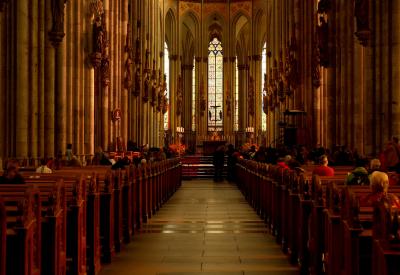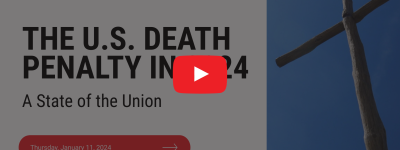
In this homily, Fr. William Kelley, S.J. provides us with an inspirational call to understand how we, as Catholics, can uphold the dignity of all human life, regardless of circumstance. This comes in light of the recent, and unexpected July 25, 2019 announcement from the Department of Justice that it will resume executions at the federal level for the first time in sixteen years.
August 4, 2019 / 18th Ordinary / Cycle C
Holy Trinity Catholic Church, Washington, DC
Fr. William Kelley, S.J.
Readings:
Lectionary: 114, page 750
Ecclesiastes 1:2, 2:21-23 Vanity of vanities! All things are vanity!
Psalm 90:3-6, 12-14, 17 If today you hear God's voice, harden not your hearts.
Colossians 3:1-5, 9-11 Seek what is above, where Christ is.
Luke 12:13-21 I shall tear down my barns and build larger ones.
Homily:
As a general practice, the Church encourages the homilist (that's me!) to preach on the the Scripture readings of the day, and to interpret those Scriptures in a way that helps us to relate God's word to our daily life, to let God's word wash over the joys and the struggles we experience, and to challenge us to love God and neighbor better. [1] From time to time, however, the Church recognizes that particular circumstances might require the homilist to shift his focus more toward doctrinal instruction and moral exhortation - that is, to use the homily to remind us what the Church teaches about a particular issue and to urge us to put that teaching into practice. [2] I think today is one of those occasions for instruction and exhortation. Why?
Ten days ago our federal government abruptly announced its intention to resume the execution of death row inmates after a hiatus of nearly two decades. Then, with unseemly haste, they promptly scheduled the executions of five men next December. Gratefully, our Catholic bishops responded immediately, expressing their concern and opposition. [3]
It seems to me that, for us here at Holy Trinity, this unanticipated government action presents us with a "kairos moment" - that is:
- a critical moment where God invites us to notice a significant event - like the reinstatement of the death penalty,
- to reflect on that event in the light of the Scriptures and Church teaching,
- and - if inspired by God - to take some action.
For a long time, the Catholic Church has prided itself on being pro-life. Unfortunately, many Catholics interpret our pro-life stance rather narrowly. In fact, they focus, almost exclusively, on strategies to eliminate abortion. While the laudable effort to protect life in the womb is an essential element of our teaching regarding the sacredness of life, it does not exhaust the Church's concern for life. Other components include the quality of life after birth. According to God's plan, every human being has the right to enjoy the fruits of creation through access to food, affordable housing, and basic medical care. Additionally, the Church's promotion of a culture of life demands that - as a community - we continue to grapple with such complicated issues as suffering at the end of life, and the proper way to punish people who commit serious crimes. The sacredness of life governs these issues too.
The Church continually endeavors to raise our awareness about how our belief in the sacredness of life should shape our understanding of such complicated issues. And, in respectful dialogue with civic leaders, the Church - both through our bishops and through individual parishioners - attempts to influence the national conversation around them. Our participation in these conversations about abortion, the right to die, and capital punishment is not meant to dictate how the rest of the country must believe and act. We do not live, after all, in a theocracy. Not everyone shares our faith-based values. We merely claim that we believe that respect for life - in every instance - makes us better human beings and therefore, better Americans. Some people welcome this thoughtful reflection of the Church. Others - including not a few Catholics - object that, when we promote the sanctity of life in concrete issues - like homelessness, or immigration, or end of life - the Church oversteps its role and intrudes into politics. It's important to remind such people that, by our baptism, we do not relinquish our citizenship; neither do we surrender our right to express our opinion about life within our national community.
So, what does the Church teach regarding the death penalty? What do we in the faith community believe and profess? Well, to put is succinctly, the Church teaches and we believe that the death penalty is never acceptable under any circumstances because it is an attack on the inviolability and dignity of the human person. [4] That phrase - "never acceptable under any circumstances" - is new as of one year ago. Prior to that, the Church grudgingly accepted the death penalty but only in those situations where it was the only possible way of protecting innocent citizens. Nevertheless, as Pope John Paul II pointed out nearly 25 years ago, many countries (including the United States) have developed highly secure detention systems and have issued sentences of life without possibility of parole. Therefore, John Paul insisted, cases where the death penalty is necessary are "very rare, if not ... nonexistent." [5]
In making the change last August, from "very rare, if not ... nonexistent" to "never acceptable under any circumstances," Pope Francis claimed that the thinking of the church has matured. For a long time we considered the death penalty to be an acceptable sentence for some few, particularly grievous crimes. Last year, however, Frances reminded us that the dignity of the human person can never be lost even if a person has committed the most atrocious crime. In the Pope's own words, "No one can take that person's life and deprive him of the opportunity to embrace again the community he has hurt and made suffer." [6]
Two weeks ago at this Mass, I asked you to pray for three minutes each day for one week to ask God to help us discern how we as a parish might respond to the migrant crisis. I also asked that, when you completed your twenty-one minutes of prayer, that you might share with us how God moved you. I was deeply touched by the depth of the written reflections that more than a dozen of you shared with me. Truly, the Spirit of God moved through our parish because of your prayer.
Today, I repeat that request - this time, making the death penalty the focus of your prayerful reflection. I ask each of you - if you are willing - to spend three minutes in prayer each day for the next seven days. During your prayer, ask God for two things:
First, ask God to strengthen within you a deep faith in the sacredness of life in every human being. Perhaps, if we as Catholics could learn to respect the sanctity of all life, others would finally recognize us as a Church that is fully and truly pro-life and not simply a Church that is correctly, but too narrowly, focused on life in the womb.
Secondly, in your prayer, ask if God wants you to do something in response to this latest government action against life. A response might be as simple as a call or email to our elected officials.
Scripture teaches: "Blessed are the merciful, for they will be shown mercy" (Luke 5:7). As Christians, you and I are called to oppose the culture of death by witnessing to something greater and more perfect: a gospel of life, hope, and mercy. But, to build a culture of life, capital punishment must be abolished. [7]
[1] The Homily and the Lectionary, Fulfilled in Your Hearing, p. 20-21.
[2] The Limits and Possibilities of Liturgical Preaching, Fulfilled in Your Hearing, p. 25-27.
[3] Statement on the Death Penalty, http://usccb.org/news/2019/19-139.cfm
[4] Catechism of the Catholic Church, §2267, revised August 2018.
[5] Pope John Paul II, Evangelium Vitae 56
[6] Pope Francis, Address to Participants in the Meeting organized by the Pontifical Council for the Promotion of the New Evangelization, 11 October 2017: L'Osservatore Romano, 13 October 2017, 5.
[7] Archbishop Thomas G. Wenski, Cardinal Seán O'Malley, USCCB Chairmen Call for Recommitment to Bishop's Catholic Campaign to End the Use of the Death Penalty, July 16, 2015


